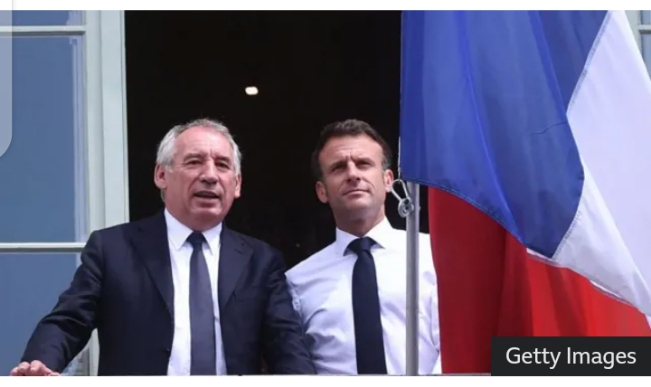Macron Names Bayrou As Prime Minister To Address Political Deadlock.
French President Emmanuel Macron has appointed François Bayrou, a seasoned centrist leader and ally, as the new prime minister in an effort to stabilise the country’s turbulent political landscape. The announcement follows months of uncertainty after a series of political upheavals and leadership changes.

Bayrou, 73, who leads the MoDem party and serves as mayor in southwest France, becomes Macron’s fourth prime minister this year. His appointment comes after the abrupt departure of Michel Barnier, who lasted only three months in the role before being ousted in a no-confidence vote.
A Challenging Political Climate
President Macron’s leadership has faced considerable challenges since calling snap parliamentary elections in the summer. The elections resulted in a fragmented National Assembly, with three dominant blocs—the left, centre, and far right—struggling to cooperate.
A recent poll by BFMTV revealed that 61% of French voters are concerned about the ongoing political instability. Socialist leader Carole Delga described the situation as a “bad movie”, while far-left France Unbowed (LFI) leader Manuel Bompard criticised the “pathetic spectacle” of governance.
Macron, now midway through his second term, is determined to govern until 2027 despite the recent setbacks. After a tense meeting at the Elysée Palace, he finalised Bayrou’s appointment and expedited the transition of power at Hôtel Matignon.
Can Bayrou Unite the Assembly?
Bayrou faces the formidable task of forming a government capable of withstanding the pressures that toppled his predecessor. Barnier’s government collapsed when Marine Le Pen’s National Rally and left-wing MPs rejected his proposed €60bn plan for tax increases and spending cuts.
To ensure stability, Macron has engaged in discussions with key political factions, excluding the far-left LFI and far-right National Rally. The president hopes to broker a deal with centre-left parties, including the Socialists, Greens, and Communists, who have expressed conditional willingness to participate in a coalition.
However, these parties have demanded significant policy changes and questioned Bayrou’s ability to lead. Greens leader Marine Tondelier dismissed the appointment, arguing that the prime minister should reflect left-leaning ideals. Similarly, Socialist leader Olivier Faure criticised far-left leader Jean-Luc Mélenchon for undermining coalition talks with his confrontational rhetoric.
A Test of Leadership
As France grapples with issues such as immigration, rising living costs, and a widening budget deficit, Bayrou’s leadership will be closely scrutinised. National Rally MP Sébastien Chenu indicated that his party could support policies addressing these crises, provided their priorities are respected.
Bayrou must also navigate the upcoming legislative hurdles, including securing approval for a replacement budget for 2025. His ability to foster collaboration across political divides will determine whether he can succeed where others have failed.
President Macron’s gamble on Bayrou reflects his desire to restore stability while avoiding reliance on far-right support. Whether this new chapter can resolve France’s political deadlock remains to be seen.


